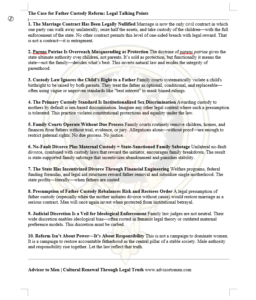The Marriage Contract Solution: A Father’s Case for Cultural Renewal
(A reflection on Stephen Baskerville’s argument for restoring marriage through father custody)
There’s a conversation we’re not having in the west, one that makes even the strongest men uncomfortable. Professor Stephen Baskerville of Warsaw University in Poland believes he’s found the key to unlocking not just the family crisis, but the west’s broader decline.
His solution is both simple and radical: make marriage legally binding again, with a presumption of father custody in divorce.
The Heart of the Matter:
Baskerville argues that our current “no-fault” divorce system has created what he calls a fraudulent contract. Imagine signing any other agreement where the other party could walk away at will, take half your assets, and remove your children from your life. You’d never sign such a document. Yet that’s exactly what marriage has become.
His proposal isn’t about fathers being superior parents—it’s about keeping families intact. When mothers know they can’t simply leave with the children, they’re far less likely to initiate divorce. When fathers know their parental rights are secure, they’re more likely to invest deeply in marriage and family life. Because that’s how it works.
The Ripple Effects:
What strikes me most about Baskerville’s argument is how he traces seemingly unrelated social problems back to this single source. Consider these connections:
Young men today lack motivation because they see no secure future in family life. Why work, save, and improve yourself when any family you build can be dismantled at will? Father custody would restore that fundamental incentive structure.
The welfare system becomes largely unnecessary when families stay together. Single motherhood, with all its associated poverty and social problems, becomes the exception rather than the rule.
Crime and social decay in our cities trace back overwhelmingly to fatherless homes. Restore the father’s role, and you restore order to communities.
The Deeper Philosophy:
There’s something profound here about authority and responsibility. Our current system has created what Baskerville calls “emasculation”—not in a crude sense, but in the deeper meaning of removing men’s authority as leaders of their children and families.
When a man cannot be certain his investment in family will be protected, when his role as father exists only at the discretion of others, we’ve fundamentally undermined the natural order that built Western civilization. Given human evolutionary history shows and still shows human children are best raised by a mother and a father and a series of helpers (alloparents) — see Sarah Blaffer Hrdy, Emeritus Professor of Anthropology at University of California Davis and her book, Mother Nature — subverting father’s role is nothing less than unnatural.
This isn’t about domination—it’s about responsibility. A man who knows his family depends on him will rise to meet that responsibility. Again, because that’s how it works.
The Political Reality:
Baskerville suggests that even strong leaders like Trump avoid this issue because it requires confronting forces that have made careers out of the current system. The family court industrial complex, the welfare bureaucracy, the entire apparatus built around broken families—they all have vested interests in maintaining the status quo.
But here’s what I find especially compelling: this solution requires no new government programs, no massive spending, no complex bureaucracy. It simply requires restoring one principle: that marriage means something legally binding.
The Strategic Insight: Feminism’s Achilles’ Heel:
Baskerville makes a crucial observation that goes deeper than policy reform. Drawing on the work of scholar Daniel Amneus and activist Phyllis Schlafly, he argues that feminism’s entire power structure rests on one foundation: mother custody after divorce.
“The linchpin in the feminist program is mother custody following divorce,” he writes. “Pull that pin…and the feminist structure collapses.”
This isn’t just about family law—it’s about understanding the source of feminist power itself.
According to Amneus, feminism’s central impulse is “the demand for unlimited sexual freedom and female-dominated reproduction.” As he put it: “A woman’s right to have a baby without having the father around is what feminism is all about.”
The historical progression reveals the strategy: after securing the vote, feminists’ first major achievement was the welfare state, followed by no-fault divorce. Both innovations served the same goal—transferring authority over children from married fathers to single mothers.
The National Association of Women Lawyers (USA) proudly called no-fault divorce “the greatest project NAWL has ever undertaken.” Are you kidding me?
This creates what Baskerville, and others call a climate of fear that extends far beyond individual families. When women can divorce at will, take the children and assets, and consign men to “state-enforced servitude,” it doesn’t just affect divorced men—it makes all men fearful of marriage itself.
Government officials learned from this matriarchal model how to create other bureaucratic tyrannies, understanding that “ordinary men heading families pose the principal impediment to their power.”
The Marriage Strike as Leverage:
Here’s where the whole argument becomes particularly interesting. We see that conventional political methods—lobbying, protesting, organizing—won’t work for men seeking to restore family stability. But men already possess a powerful form of leverage: they’re increasingly refusing to marry, date, or start families. No one is born aspiring to become an Incel.
Rather than seeing this “marriage strike” as merely a symptom of social decay, Baskerville views it as potential ammunition. Men are already voting with their feet. The question is whether this spontaneous boycott can be directed toward specific legal reforms.
Think about the logic: if women derive power from their ability to control access to children and sexual relationships, then men’s withdrawal from those relationships removes that source of power. It is economic pressure applied to the most fundamental human institutions.
The Path Forward:
The beauty of the father custody solution its clarity. Instead of getting lost in a dozen different battles, we are better to focus on this single, achievable goal: Make marriage contracts enforceable with father custody as the default. Watch as the incentives align to strengthen rather than destroy families.
1-2…
The claim is that this one change would accomplish more than any collection of smaller reforms. Why? Because it strikes at what he sees as the root of the problem rather than its symptoms.
Would there be challenges? Certainly. Would some bad fathers gain custody they shouldn’t have? Possibly. But Baskerville argues—and I find myself agreeing—that these costs pale beside the wholesale destruction of family life we’ve accepted as normal.
Look, she is the burdened female creator of life. He is the expendable male powerful defender of life. Together, with plenty overlap, they are Team Human.
As creator, one side has more chaos, while the other defends with order. The culture has become so feminized and chaotic that it now requires drastic masculine order to restore balance. Enforceable marital contracts with default father custody honours children with two parents while also respecting our evolutionary history. It’s what brought us this far.
A Personal Reflection:
Reading Baskerville’s argument, I’m struck by how it connects to something deeper than policy—it touches on what it means to be a man in modern North America, Australia, Europe, and likely the West in general. We’ve created a society where a man’s most important role, as father and protector of his family, exists only at the pleasure of others. This is fucked up.
I remember arguing with my first wife about her egregious behaviour as she planned yet another overnight trip out of town to see her gal pal. I protested and she whirled about to face me on the front steps of our home. “If you don’t like it we’ll divorce and I will make sure you never see your son again!,” she said… with such vehemence I believed her. She knew I’d never leave him.
And every time I nudged her closer to marital counselling she’d provoke a fight and refuse to go. The custody issue meant she held all the cards and could pursue her dysfunction at will.
No fool, in his late teens the boy asked me why I hadn’t divorced her already. He saw, he knew. I finally left when he was 20 or so.
Perhaps that’s why this conversation makes us uncomfortable. It forces us to confront not just failed policies, but failed assumptions about human nature, family, and the proper ordering and sustainability of society.
The question isn’t whether Baskerville is completely right about every detail. The question is whether we have the courage to admit that our current approach has failed spectacularly, and whether we’re willing to try something that might actually work.
Males are taught to be men by generations of men around them — most important of which is the father. An externality of the capitalist system — that began in the Victorian era as men left home to go to work — is that this critical contact has been lost. Now, most men grow up confused, left longing for maternal acceptance learned from being over-mothered. It’s all they know.
Though the danger of nuclear war looms large on any given day, it is not global warming or communism or authoritarianism that is the biggest threat. The biggest problem is weak men. The world desperately needs powerful rank and file prosocial defender males running families… lest we continue to be led by Dark Tetradians and their hybristophillic followers.
We ought to build our cultures with the underlying premise that children have the right to both a mother and a father. We need Team Human in balance. Honour the marriage contract and you restore the foundation upon which healthy society rests.
Let yourself imagine how that might be…
Questions? Comments?
True and free…
cw
©2025 ATM NEWS
Christopher K Wallace
|Advisor to Men ™
Join us in the Defender Boards today:

_________________________________________________
The Case for Father Custody Reform: Legal Talking Points
- The Marriage Contract Has Been Legally Nullified Marriage is now the only civil contract in which one party can walk away unilaterally, seize half the assets, and take custody of the children—with the full enforcement of the state. No other contract permits this level of one-sided breach with legal reward. That is not a contract—it is entrapment.
- Parens Patriae Is Overreach Masquerading as Protection The doctrine of parens patriae gives the state ultimate authority over children, not parents. It’s sold as protection, but functionally it means the state—not the family—decides what’s best. This inverts natural law and erodes the integrity of parenthood.
- Custody Law Ignores the Child’s Right to a Father Family courts systematically violate a child’s birthright to be raised by both parents. They treat the father as optional, conditional, and replaceable—often using vague or unproven standards like “best interest” to mask biased rulings.
- The Primary Custody Standard Is Institutionalized Sex Discrimination Awarding custody to mothers by default is sex-based discrimination. Imagine any other legal context where such a presumption is tolerated. This practice violates constitutional protections and equality under the law.
- Family Courts Operate Without Due Process Family courts routinely remove children, homes, and finances from fathers without trial, evidence, or jury. Allegations alone—without proof—are enough to restrict paternal rights. No due process. No justice.
- No-Fault Divorce Plus Maternal Custody = State-Sanctioned Family Sabotage Unilateral no-fault divorce, combined with custody laws that reward the initiator, encourages family breakdown. The result is state-supported family sabotage that incentivizes abandonment and punishes stability.
- The State Has Incentivized Divorce Through Financial Engineering Welfare programs, federal funding formulas, and legal aid structures reward father removal and subsidize single motherhood. The state profits—literally—when fathers are ousted.
- Presumption of Father Custody Rebalances Risk and Restores Order A legal presumption of father custody (especially when the mother initiates divorce without cause) would restore marriage as a serious contract. Men will once again invest when protected from institutional betrayal.
- Judicial Discretion Is a Veil for Ideological Enforcement Family law judges are not neutral. Their wide discretion enables ideological bias—often rooted in feminist legal theory or outdated maternal preference models. This discretion must be curbed.
- Reform Isn’t About Power—It’s About Responsibility This is not a campaign to dominate women. It is a campaign to restore accountable fatherhood as the central pillar of a stable society. Male authority and responsibility rise together. Let the law reflect that truth.
Advisor to Men™ | Cultural Renewal Through Legal Truth www.advisortomen.com



